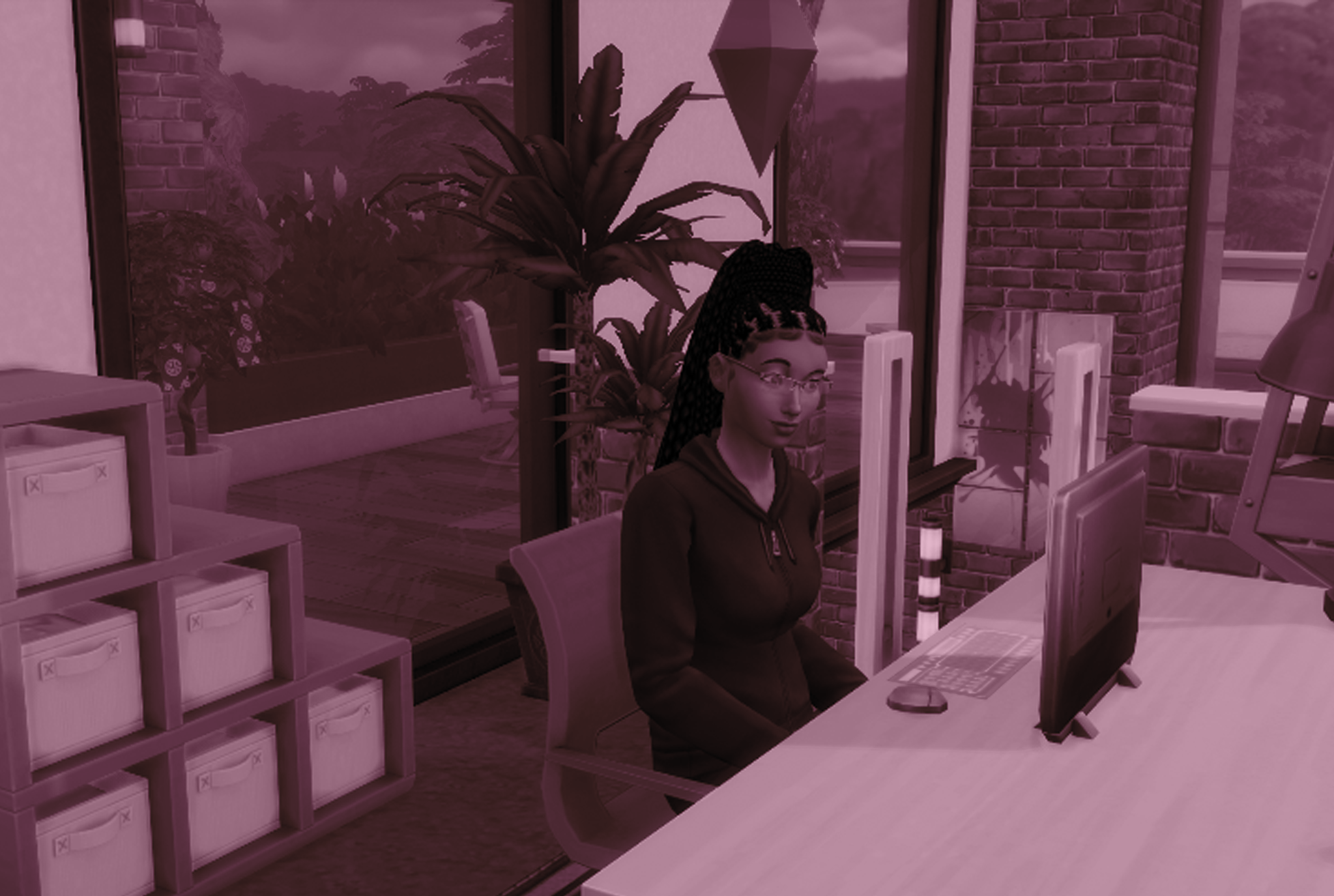First published in UOL Start, 6 October 2020, as “Pandemia e maus hábitos: como The Sims 4 virouminha máquina do tempo”. Translated by Loreta Saddi.
What on earth was this pandemic going do to our mental health? Well, at least there’s always therapy.
During the peak of Covid-19 cases, when the world was upside-down, I needed to get away. I decided on The Sims 4 as the perfect destination; bought a one-way ticket and a “do not disturb” sign.
And it was so good. You know that moment when you really get into a game and forget all the day-to-day worries of your real life? So good. I played, and played, and played. After a few hours I must have looked just like Raquel the teenager—the only thing missing was my parents telling me to turn off the computer for dinner.
It had been a long time since I last played The Sims, but the controls were all still there, waiting at my fingertips. I started by creating my character: Raquel, a black woman, living independently and—maybe this shouldn’t come as a surprise—working as a game developer.
In my game, Raquel’s days were quiet. Her house was neat (please don’t ask me about how that compares to the real world). She worked for hours, took a few breaks for meals, and soon enough each of her days rolled on to its end.
Digital Raquel’s office had charming knick-knacks and an immensely powerful computer (if only I had a computer like that in real life). At the end of the day, she would take a well-deserved and comforting rest. And the next day, she would do the same thing again. Day after day, the quiet, careful routine repeated itself. Wonderful.
But something was wrong. Sim Raquel started to have less energy. When I had first set her to work—earlier that evening—she had looked young and happy, but now she looked exhausted. She was working too hard.
What did I do wrong? Perhaps, I thought, I should quit playing and come back the next day; but on the other hand staying up all night on your own is one of the gifts of adult life. Why let sleep take that from me? Which is to say: I decided to stay up all night and fix Sim Raquel’s boring routine.
It was only after hours of gameplay, and countless mess-ups as I struggled to make Sim Raquel’s life healthy and happy, that I realised what was going on. Nothing could fix Sim Raquel’s routine—because her routine was mine.
Raquel, game developer at Sue The Real, had been incarnated way too accurately within The Sims, and that was exactly game-Raquel’s problem. If it hadn’t been funny, maybe it would have been tragic. But it was a stroke of luck as well: by creating myself within the game, I’d received a glimpse of my future, like that Adam Sandler movie Click.
The Sims, a life simulation game, made me look at the way I was living my real life and neglecting my health.
Well. If I’d managed to see this vision of a terrible future for myself, maybe I could see a good one as well. I braved the game again to create another character, “Rawop”—I’d learned my lesson about using my own name!
Like me and like Sim Raquel, Rawop was a game developer, but unlike Sim Raquel she had other personality traits as well. She worked, yes, but she would also hang out, eat healthy food, leave the house to see nature. She would exercise. She would read books. She would really connect with other people.
Sounds perfect, right? But even though I’d created Rawop to represent and explore an ideal life—a life that was out of reach for now due to the pandemic—watching her go about her optimised days eventually made me feel that this opposite extreme was bad too. Both Raquel and Rawop were going too far.
And so as I sat there and played, my life crisis was unveiled in front of me. The Sims, an innocent game I’ve been playing since my teens, got me thinking intensely about what I was in the past, and what I am now, and what I will become.
Well. Life is full of surprises, right? We can always learn something new. We can start over, tweak some decisions, avoid repeating the same mistakes.
And we can try it all out for practice by playing The Sims. Create a character with some habits, make some changes, see how you feel about their life, and about yours. If you give it a go—and I strongly recommend it—let me know how it turns out!
Raquel Motta (website, twitter, instagram) is a game developer, black woman, founder, and CEO at Sue The Real, a game studio focusing on afro diasporic narratives. Raquel graduated from Fatec Ipiranga, engaged in system analysis and development, and is a writer of games and emotional experiences. In her spare time, she likes to study finance, vegetarianism, and environmental sustainability.
Image: writer’s own.
